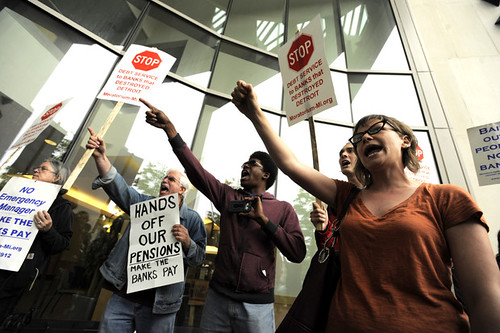
Detroit Moratorium NOW! Coalition protest outside the Wayne State University Law School on June 10, 2013. The demonstrations called for the end of emergency management and a moratorium on debt service. , a photo by Pan-African News Wire File Photos on Flickr.
Detroit residents cope with bankruptcy in daily lives
1:02 AM, October 3, 2013
by John Wisely, USA TODAY
DETROIT - Sheri Divers has long known that the roar of the engine and the squeal of air brakes mean the garbage truck is nearby.
She and other Detroit residents used to expect those sounds on weekday mornings. But now?
"We've seen the garbage being picked up at strange times, and anytime they come, you can hear it," said Divers, a native Detroiter who's lived in her house on Stoepel Street since 2008. "We've seen the garbage pickup at 9 o'clock at night, early Sunday mornings. It's horrible. But at least they are picking it up."
The odd trash pickup times are one of the ways life has changed for Detroiters since the city filed the largest municipal bankruptcy in U.S. history July 18.
Many buses run late, or not at all. Almost half of the city's streetlights are out. Retirees and city workers live in fear of cuts to their wages and benefits.
Detroit's services have been declining for years as city finances spiraled out of control, but the bankruptcy brought new focus on the struggle to provide even the basics to 700,000 residents.
Gary Brown, the city's chief operating officer, says better times are ahead. "I don't know that services have improved, but they haven't gone down either," Brown said. "It's going to get a lot better."
There are some signs of the hope Brown expresses.
The Obama administration assigned a Treasury official, Don Graves, to coordinate about $300 million in aid from public and private sources to help the city rebound. The city is working on a $160 million deal that will help update its troubled public lighting division and have it run by DTE Energy, a local utility.
Last month, the family that founded automotive information company R.L. Polk donated $10 million to the Detroit Zoo to build the Polk Family Penguin Conservation Center.
The goal of Detroit's bankruptcy is to shed some of the approximately $18 billion in debt to free up money to provide more basic services. In the meantime, residents struggle with less than stellar services.
In the past year, the city has closed 15 firehouses and demoted 200 firefighters to lower ranks to save money. About 800 firefighters remain in the ranks, responding to more than 30,000 calls a year.
Detroit has no subways or light rail, so buses transport most people without cars. On weekdays in September, about 86% buses made it out to their routes. The remaining 14% never even left the terminal.
"It's a huge problem in people's lives," said Megan Owens, executive director of Transportation Riders United, a non-profit transit advocacy group. "We're hearing people losing jobs because they can't get there on time or they have to plan to get there two hours early in case their bus is late."
Brown acknowledged that bus service is plagued by the same problems that cause garbage trucks to be off the road for weeks: a lack of mechanics and parts.
Joe Valenti, president of Teamsters Local 214, which represents garbage truck drivers, blames the city's incompetence at fixing vehicles. Brown admits troubles fixing all city vehicles, noting that buying replacement parts can be delayed by suppliers who want to be paid up front.
The city plans to privatize trash collection by January. Contractors will handle garbage truck maintenance, freeing city mechanics to work on buses and firetrucks, Brown said.
The effects of the bankruptcy are more personal for some Detroiters. Roger Howard, 55, spent 31 years emptying wastebaskets, mopping floors and doing other work in city-owned buildings. He retired in July 2012. His city pension pays him $1,388 a month, and he pays about $300 a month for his health care benefits, which he has used frequently since suffering a mild stroke two months ago.
Emergency Financial Manager Kevin Orr has said the city's two pension systems are underfunded and mismanaged. "He's talking about cutting our pensions," Howard said. "And that money in the health care was promised to us."
Dwayne Provience, 40, has a personal stake as well. He served almost 10 years in Michigan prisons on a murder charge that was dismissed in 2009 after evidence showed Detroit police hid exculpatory evidence. In 2010, he sued, and after more than three years of wrangling, a federal appeals court ruled July 5 that his case could go to trial. Two weeks later, the city filed bankruptcy, placing all litigation on hold.
"It was very devastating," Provience said. "I thought, we were so close to settling this with the city. It was like a double slap in the face."
No comments:
Post a Comment